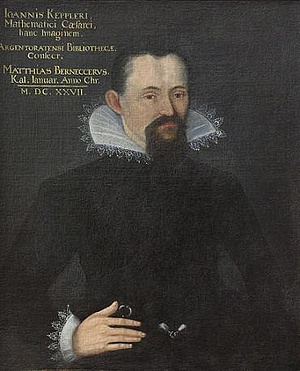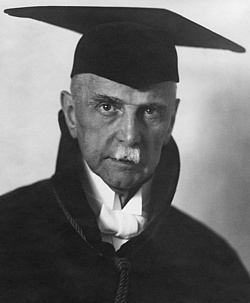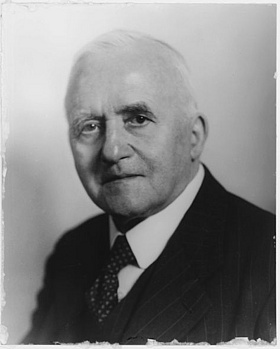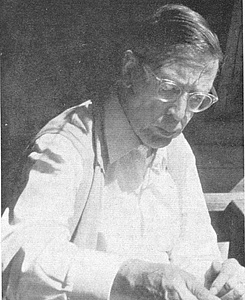History of the Kepler Commission
For a long time in history Kepler's Opus passed unregarded in its entity and complexity. It was not earlier than with the blossoming sense of national identity in Germany during the 19th century, that his works were collected for the first time: Christian Frisch (1807–1881) published his eight volumes of Kepleri Opera omnia from 1858 to 1871.

There is no doubt that Frisch earned great scientifical merits with his compilation in which even the commentary parts were composed in Latin, and it should be noted that he strived to integrate large parts of unedited manuscript material. But over time it became evident that his array of texts, letters, manuscripts, and commentaries was arbitrary, and that faults occurred in his edition. Furthermore, several Kepler manuscripts were newly discovered which Frisch could not have considered in his work.
So in May of 1914 at a Vienna conference, a plan for a new and much enlargened edition of Kepler's works was presented by Walther von Dyck (1856-1934), then Rector of the Technical University of Munich. Walther von Dyck succeeded in a daring endeavour: In the difficult post-war period he managed – from 1928 on – the transport of each single manuscript page from Leningrad (where – now called St.Petersburg – Kepler's heritage is kept up to now) to Munich where each page was reproduced and sent back. These facsimiles were and are the most important foundation for the work of the Kepler Commission.

So in May of 1914 at a Vienna conference, a plan for a new and much enlargened edition of Kepler's works was presented by Walther von Dyck (1856–1934), then Rector of the Technical University of Munich. Walther von Dyck succeeded in a daring endeavour: In the difficult post-war period he managed – from 1928 on – the transport of each single manuscript page from Leningrad (where – now called St.Petersburg – Kepler's heritage is kept up to now) to Munich where each page was reproduced and sent back. These facsimiles were and are the most important foundation for the work of the Kepler Commission.

The first staff member of importance was Max Caspar (1880–1956), who attracted von Dyck's attention with his German translation of Kepler's Mysterium Cosmographicum (Augsburg 1923).
A great stimulus for both came from the mathematician Alexander von Brill (1842–1935) and his distinctive interest in Kepler, von Dyck being von Brill’s former student and later on his friend, while Caspar was awarded his doctorate by von Brill in 1908.
Having been commissioned with the editing work in 1934, Caspar managed to steer the Keplerian enterprise even through the difficult war years.


Franz Hammer (1898–1969), librarian at the Statal Library in Stuttgart, though seriously disabled by war wounds, headed the Commission from 1956 to 1969, with the assistance of Martha List (1908–1992).
Besondere Verdienste hat sich auch der Physiker Walther Gerlach (1889–1979) erworben. Von 1976 bis 2003 wurde die Ausgabe von Volker Bialas (seit 1986 als wissenschaftlicher Leiter) betreut.
Von 1984 bis 1999 hatte Ulrich Grigull (1912–2003), früherer Präsident der Technischen Universität München den Vorsitz der Kepler-Kommission inne und von 1999 bis 2017 Roland Bulirsch.
The Last Members of the Commission
Prof. Dr. Dr. h.c. mult. Roland Bulirsch, Vorsitzender Chairman
Prof. Dr. Volker Bialas, München
Prof. Dr. Peter Brosche, Bonn
Prof. Dr. Menso Folkerts, München
Prof. Dr.-Ing. Dr.-Ing.E.h. Reiner Rummel, München
Dr. Friedrich Seck, Tübingen
† Dr. Hans Wieland, München
Physicist Walther Gerlach (1889–1979) also earned special merits. Volker Bialas managed the bulk of the editing work from 1976 to 2003.
Ulrich Grigull (1912–2003), former president of Technische Universität, Munich, chaired the Kepler-Commission from 1984 to 1999, and Roland Bulirsch served as its president from 1999 to 2017.
Literature
Ulf Hashagen, Walther von Dyck (1856–1934). Mathematik, Technik und Wissenschaftsorganisation an der TH München, Stuttgart, 2003.
Ulrich Grigull, „Sechzig Jahre Kepler-Kommission”, in: Sitzungsberichte der Bayerischen Akademie der Wissenschaften [Sitzung vom 5. Juli 1996], 1996.
